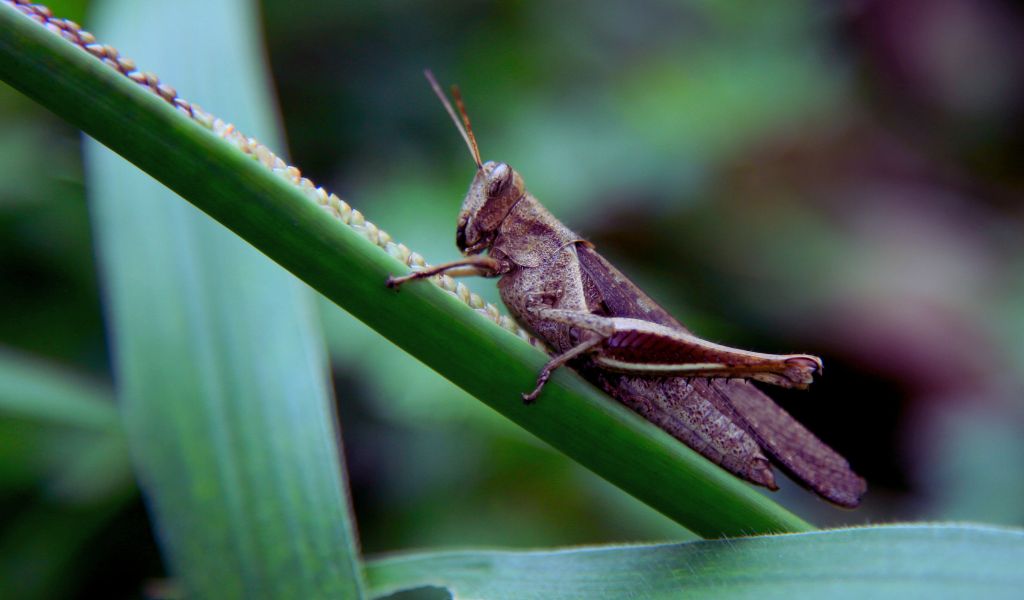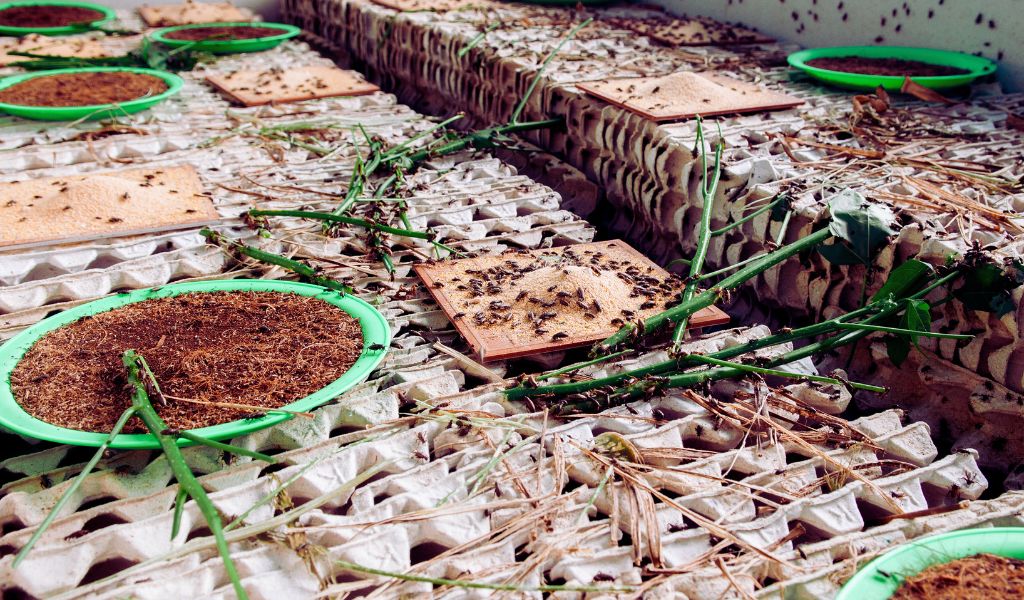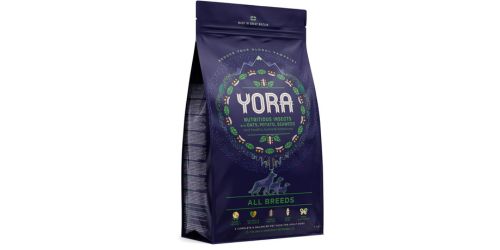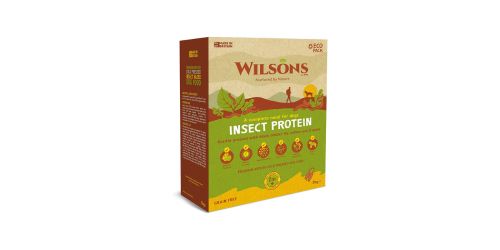Insect-based dog food is a novel and increasingly popular alternative to traditional pet food.
This innovative food source uses insects as the primary protein ingredient, offering a sustainable and nutritious option for our canine companions.
Insect-based dog food, using insects like black soldier fly larvae, mealworms, and crickets as primary protein sources, offers a sustainable and nutritious alternative to traditional pet food. It is rich in protein, healthy fats, vitamins, and minerals, providing essential nutrients for dogs while being hypoallergenic and easier on their digestive systems.
The Rise of Insect-Based Dog Food
Historical Context and Development
Insect consumption, or entomophagy, has been a part of human diets for centuries in various cultures around the world.
However, the concept of using insects as a primary ingredient in pet food is relatively new.
The development of insect-based dog food has been driven by growing environmental concerns, the search for sustainable protein sources, and the need for hypoallergenic diets for pets.
Drivers Behind the Popularity
Environmental Concerns
Traditional livestock farming is considered, by some, to be a contributor to greenhouse gas emissions, deforestation, and water usage.
Insects, on the other hand, require significantly less land, water, and feed, making them a more sustainable protein source.
This environmental benefit is a key driver behind the growing interest in insect-based dog food.
Nutritional Benefits
Insects are rich in protein, fats, vitamins, and minerals, offering a well-rounded nutritional profile for dogs.
They provide essential amino acids and nutrients that are comparable, and sometimes superior, to traditional protein sources like chicken, beef, and fish.
Allergies and Food Sensitivities
Many dogs suffer from allergies and sensitivities to common protein sources.
Insects offer an alternative that is less likely to trigger allergic reactions, providing relief for dogs with dietary restrictions.
Types of Insects Used in Dog Food
Black Soldier Fly Larvae
Black soldier fly larvae (BSFL) are one of the most commonly used insects in dog food.
They are rich in protein and fats, and their farming is highly sustainable due to their rapid growth and minimal resource requirements.
Mealworms
Mealworms are another popular choice, known for their high protein content and palatability.
They are easy to farm and process, making them a viable option for insect-based pet food.
Crickets
Crickets are widely recognized for their nutritional benefits, including high levels of protein, vitamins, and minerals.
They are also relatively easy to farm and have a low environmental footprint.

Other Potential Insects
Other insects like locusts, grasshoppers, and silkworms are being explored for their potential use in pet food.
Each of these insects offers unique nutritional benefits and sustainability advantages.
Nutritional Profile of Insect-Based Dog Food
Protein Content
Insect-based dog food is typically high in protein, which is essential for dogs’ muscle development and overall health.
The protein from insects is highly digestible and contains all the essential amino acids dogs need.
Fat Content
Insects also provide healthy fats, including omega-3 and omega-6 fatty acids, which are crucial for maintaining healthy skin and coat, as well as supporting cognitive function.
Vitamins and Minerals
Insects are rich in various vitamins and minerals, such as B vitamins, iron, zinc, and magnesium.
These nutrients are vital for dogs’ immune function, energy metabolism, and overall well-being.
Comparison with Traditional Protein Sources
Compared to traditional protein sources, insects offer a comparable, if not superior, nutritional profile.
They provide high-quality protein and essential nutrients while being more sustainable and environmentally friendly.

Health Benefits for Dogs
Improved Digestion
Insect-based proteins are highly digestible, making them easier on dogs’ digestive systems.
This can lead to better nutrient absorption and overall digestive health.
Reduced Allergies
For dogs with food allergies or sensitivities, insect-based dog food offers a hypoallergenic alternative.
It reduces the risk of adverse reactions compared to common protein sources like beef, chicken, or soy.
High Protein Content
The high protein content in insect-based dog food supports muscle development, energy levels, and overall health.
It’s particularly beneficial for active and growing dogs.
Enhanced Skin and Coat Health
The healthy fats found in insects, particularly omega-3 and omega-6 fatty acids, promote healthy skin and a shiny coat. They also support cognitive health and reduce inflammation.

Environmental Impact
Sustainability of Insect Farming
Insect farming is highly sustainable, requiring less land, water, and feed compared to traditional livestock farming.
Insects can be raised on organic waste, further reducing their environmental footprint.
Lower Greenhouse Gas Emissions
Insect farming produces significantly lower greenhouse gas emissions compared to livestock farming.
This reduction in emissions is considered by some to contribute to mitigating climate change.
Reduced Water and Land Usage
Insects require minimal water and land to farm, making them a more resource-efficient protein source.
This efficiency helps conserve precious resources and reduces the environmental impact of food production.
Production Process of Insect-Based Dog Food
Farming and Harvesting Insects
Insects are farmed in controlled environments that ensure optimal growth conditions.
They are harvested at the peak of their nutritional value to ensure the highest quality protein.
Processing Techniques
Once harvested, insects are processed using methods such as drying, grinding, and defatting.
These processes help preserve their nutritional content and make them suitable for inclusion in dog food.
Quality Control Measures
Strict quality control measures are in place to ensure the safety and quality of insect-based dog food.
These measures include testing for contaminants, monitoring nutritional content, and adhering to regulatory standards.
Packaging and Distribution
Insect-based dog food is packaged in eco-friendly materials and distributed through various channels, including pet stores and online retailers.
The packaging ensures freshness and convenience for consumers.

Safety and Regulatory Considerations
Regulatory Status in Various Regions
The regulatory status of insect-based dog food varies by region.
In some areas, it is already approved and widely available, while in others, it is still undergoing evaluation by food safety authorities.
Safety Standards and Certifications
Insect-based dog food must meet stringent safety standards and certifications to ensure it is safe for canine consumption.
These standards cover everything from farming practices to processing and packaging.
Potential Risks and How They Are Mitigated
While insect-based dog food is generally considered safe, potential risks include contamination and allergic reactions.
These risks are mitigated through rigorous quality control measures and adherence to safety standards.
Market Trends and Consumer Acceptance
Current Market Trends
The market for insect-based dog food is growing rapidly, driven by increasing awareness of its environmental and health benefits.
More brands are entering the market, offering a variety of products.
Consumer Perceptions and Acceptance
Consumer acceptance of insect-based dog food is on the rise, with many pet owners recognizing its benefits.
Positive reviews and word-of-mouth recommendations are helping to drive its popularity.
Comparative Analysis with Traditional Dog Food
Nutritional Comparison
Insect-based dog food offers a comparable, and sometimes superior, nutritional profile to traditional dog food.
It provides high-quality protein, essential fats, and important vitamins and minerals.
Environmental Impact Comparison
The environmental impact of insect-based dog food is significantly lower than that of traditional dog food.
Insect farming uses fewer resources and produces fewer emissions, making it a more sustainable choice.
Cost Comparison
While insect-based dog food can be more expensive than traditional options, its benefits often justify the higher cost.
The reduced environmental impact and health benefits make it a worthwhile investment for many pet owners.
Taste and Palatability
Most dogs find insect-based dog food palatable, though some may require a gradual transition to adjust to the new taste.
Positive feedback from pet owners suggests that many dogs enjoy the taste.
How to Transition Your Dog to Insect-Based Food
Gradual Introduction Steps
To transition your dog to insect-based food, start by mixing a small amount with their current food.
Gradually increase the proportion of insect-based food over several days or weeks.
Monitoring Your Dog’s Response
Pay close attention to your dog’s response during the transition. Look for signs of improved digestion, energy levels, and overall health.
Adjust the transition process as needed based on their reaction.
Adjusting Portion Sizes
Ensure you provide the correct portion sizes based on your dog’s weight, age, and activity level.
Consult the feeding guidelines provided by the insect-based dog food brand.
Combining with Traditional Food
If your dog is hesitant to switch entirely, you can combine insect-based food with their traditional diet.
This approach can help them adjust gradually and still receive the benefits of insect-based nutrition.
FAQs About Insect-Based Dog Food
Is Insect-Based Dog Food Safe?
Yes, insect-based dog food is safe for dogs. It undergoes rigorous quality control and meets safety standards to ensure it is suitable for canine consumption.
What Are the Nutritional Benefits?
Insect-based dog food is rich in protein, healthy fats, vitamins, and minerals. It provides essential nutrients that support overall health, digestion, and skin and coat condition.
How Is It Different from Traditional Dog Food?
Insect-based dog food uses insects as the primary protein source, offering a sustainable and hypoallergenic alternative to traditional meat-based dog food. It also has a lower environmental impact.
Can All Dogs Eat Insect-Based Food?
Most dogs can eat insect-based food, but it’s always best to consult with a veterinarian before making any dietary changes, especially for dogs with specific health conditions or dietary needs.
How Sustainable Is Insect-Based Dog Food?
Insect-based dog food is highly sustainable. Insect farming requires fewer resources, produces fewer greenhouse gases, and uses less land and water compared to traditional livestock farming.
Insect-based dog food presents a promising alternative to traditional pet food, offering numerous health and environmental benefits.
Its high protein content, hypoallergenic properties, and sustainability make it an attractive option for many pet owners.
As consumer acceptance grows and more brands enter the market, the future of insect-based dog food looks bright.





